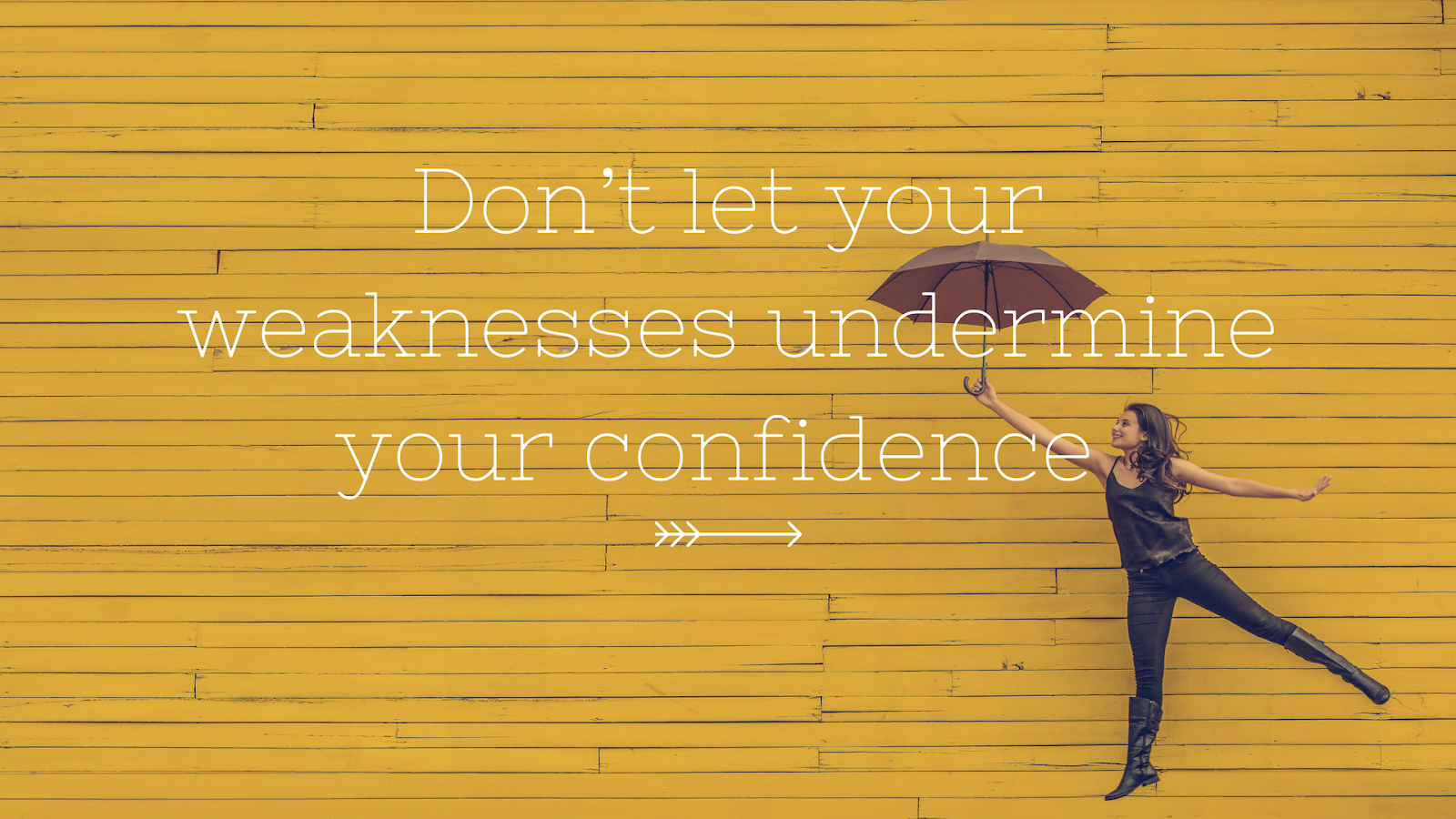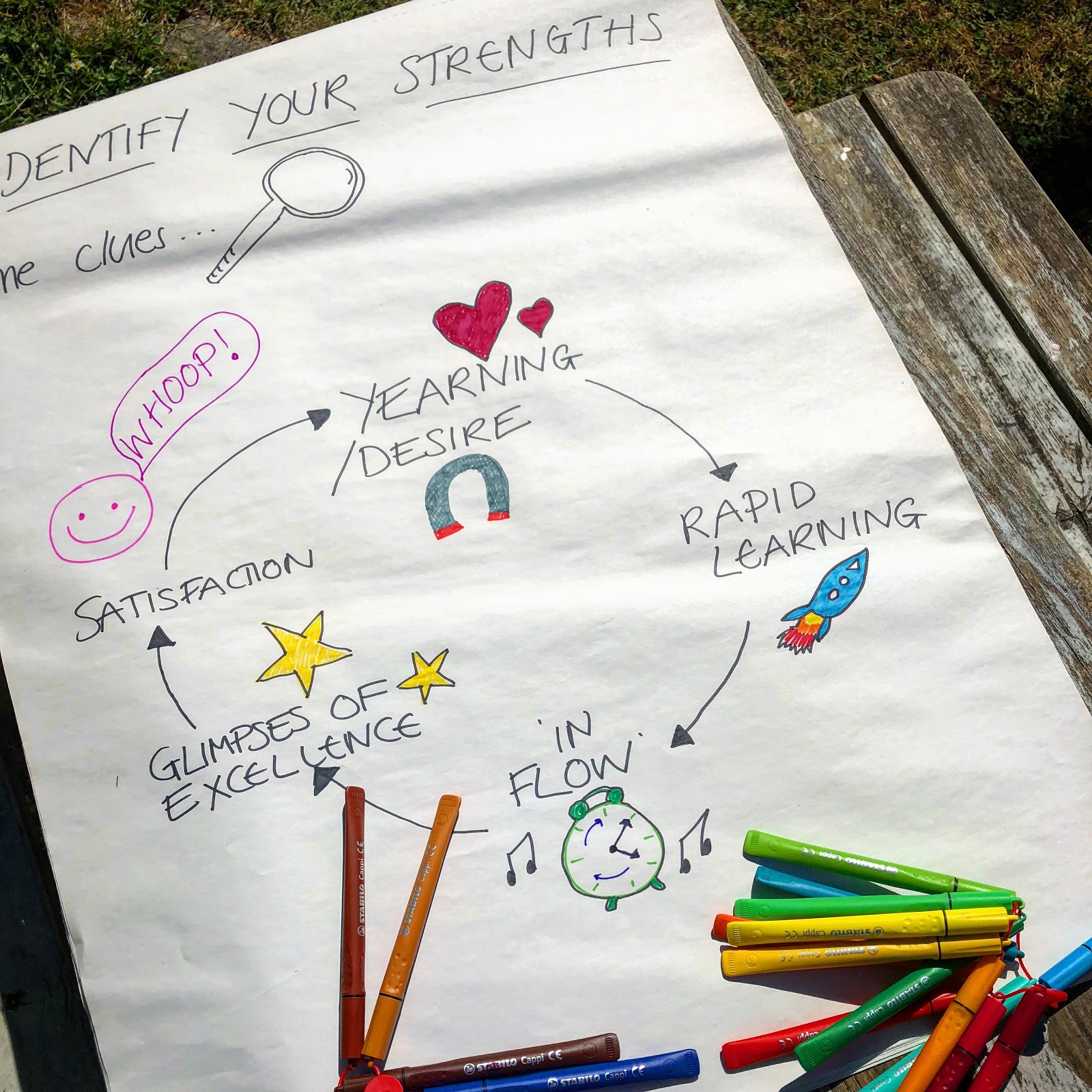
In my last article, Curating a Confident Mindset Through Your Strengths, you may recall how we examined the power of positive psychology and strengths-building versus weakness-fixing. In other words, how when we play to our strengths every day we can expect to experience higher levels of satisfaction, deliver better quality outputs and therefore boost the confidence we have in our own abilities.
You might therefore be forgiven for assuming that all this chat about positive psychology and strengths-building would mean we can forget about our weaknesses altogether. Think again. Our weaknesses, or anything that might get in the way of our success, need to be managed in order to allow our strengths to flourish.
Let’s not forget about our weaknesses
We all tend to have far greater awareness of our weaknesses than we do our strengths. They are those things we are likely to leave until last on our to do lists, the things that drain us of energy, take a long time to do or those activities that we try to avoid doing all together wherever possible! Watch out for overplayed strengths becoming weaknesses too!

There are various ways we can manage our weaknesses to allow our strengths to flourish:
- Try to leverage the strengths you do have to compensate for your weaknesses. My example on this one is that I am naturally fairly undisciplined and have the tendency to be late for social engagements (!). So what I try to do (not always successfully!) is to leverage a strength I do have which is empathy and remind myself how awful that person would feel if they were left waiting for me on their own!
- Mitigate against the risk associated with your weakness by ensuring adequate competency in it. For example, if you occasionally need to use Excel for your bookkeeping and it isn’t a strength, a basic course might help ensure you don’t make any schoolboy errors that could undermine your business’ success.
- If you have the luxury of teammates or work colleagues, why not delegate the thing you struggle with to someone for whom it is a strength? If you run your own business and can afford to, why not outsource the work? Failing that, why not do a skills / strengths swap with another small business owner?
- Last but not least, don’t beat yourself up about being less good at something, especially if you don’t actually need to be good at it in your line of work! Contrary to social media, none of us are – or indeed need to be – super-human and good at everything.
Activity:
Take a look back at the activity right at the start of the last article “Curating a confident mindset through your strengths” when I asked you to think of a time when your confidence was at an all time LOW. Were you having to use your weaknesses then by any chance? What would you do differently now, knowing what you do about managing weaknesses?
What else can undermine our confidence?
There are lots of other pesky mindset critters that can undermine our confidence. Here are just a few of them: fear of failure can be a biggie, fear of our true selves, denial, guilt, self-limiting beliefs, self-sabotage, imposter syndrome, procrastination a negative mindset, perfect vs done, comparisonitis…and the list goes on and on. The good news is that, according to the Law of Attraction, if we stop and shift our focus back to what is going well, what we’re good at and what we love doing (our strengths), positive change will follow the focus of our attention. We will be able to achieve better and better results and experience a greater sense of satisfaction in all that we do. The happy byproduct of all these great results and satisfaction is a well-deserved boost to our otherwise flailing confidence levels.
3 Other simple ways to boost your confidence
- Trusted friends, family-members, colleagues, clients and customers are often a great source of potential confidence and insight into your strengths. Why not ask them to describe you at your best? How do you come across? What can you handle? How do you behave? Keep hold of any positive feedback from emails, social media or testimonials that you receive and keep them in an easily accessible folder called “Boosters” or something similar. Dip into them when you feel your confidence taking a dip. What patterns emerge? What common themes or strengths threads run through the positive feedback you receive?
- And if there isn’t anyone on hand to provide you with the feedback you need to hear, stop and remind yourself of all the great things you have achieved and the hard work, long hours, unfailing commitment etc you have put in to get you where you are today.
- Take a look at the type of language you are using. Can you make it more positive in order to shift your perspective? Take a look at your body language or stance if you are presenting. How can you get more of those feel-good hormones pumping round your body by standing taller, with optimal posture?
Summary
There will always be situations and people in life that will, intentionally or otherwise, try to erode your confidence. Remember, you always have a toolkit of brilliant strengths, unique to you, at your disposal every single day if you choose to use them. The key is to identify, recognise and maximise them so they can be your rocket fuel when the going gets tough.
I am a qualified strengths coach and I run my own career and professional confidence coaching consultancy, Shine Brighter Mums. I also provide employee engagement and workplace culture consultancy as Shine Brighter Consulting.
You can find me on:
@shinebrightermums on instagram and Facebook and on twitter as @shinebright_sjc
www.shinebrighterconsulting.co.uk
07990 578180

‘Confidence’ is the universally favourite topic amongst self-care bloggers and personal development gurus these days. And there’s a reason for that. Because it’s powerful. Having it in abundance can often determine – rightly or wrongly – the degree of success we experience in our personal and professional lives.
‘Curating’ a confident mindset
I’ve used the rather antiquated term “curating’ here for a reason. If you look at a dictionary definition of the verb ‘to curate’, you will see that it has the following meanings:
‘To look after, care for or nurture something (often fragile)’
‘To select’
‘To organise’
You’ll hopefully see that my choice of word wasn’t entirely accidental! Confidence is indeed a fragile beast and something that requires some very special care and attention if you are to nurture and build upon it. You will need to proactively find it and select it; whip it out of your toolkit when you need it most. It’s also possible to organise components of it so you can pull out your ‘best bits’ wherever appropriate.
Why feeling confident is useful (in case you were in any doubt!)
Let’s take some examples of where having confidence could make or break your personal or professional success in life.
You may run your own business where you are your USP and you are in effect selling yourself every day. If you aren’t confident in your own abilities, business model, products or services, you’re going to have a tough time convincing your prospective customers and clients that they should have confidence in you or your business proposition and in turn part with their hard-earned cash.
Perhaps you have an interview lined up for a fantastic new job that you have your heart set on. Presenting your own unique skills, values and capabilities in a confident (but authentic) way may make all the difference as to whether or not they offer you the job.
Confidence matters. Regardless of your personal or professional situation. Learning how to tap into it at a moment’s notice is a skill worth learning!
Activity: What does confidence look like to you?
Think of a time when you felt your confidence levels were at an all time LOW.
And now think about a time when your confidence levels were at an all time HIGH.
What were you doing, thinking, feeling and saying in each situation?
Fact: 9/10 we tend to feel most confident when we are playing to our STRENGTHS. Can you observe this from your own responses about when your confidence was in abundance or lacking?
What are strengths?
An organisation called Gallup have done a huge amount of research into what makes people successful and satisfied, both personally and professionally. They found that the most successful people and teams were all able to play to their strengths every day.
Their definition of a strength is as follows: “A consistent pattern of thought, feeling or behaviour – rooted in talent – that enables GREAT as opposed to good performance, leading to valued outcomes and results and leaves us feeling motivated and energised.”
They sound pretty useful, right?! Isn’t it time you tapped into your own super-power strengths?
Identify your own strengths right now
Can you honestly say that you know what your strengths are? Women are notoriously bad at identifying (and shouting about!) their own strengths so here are some handy clues to help you identify yours:

- Yearning – The first thing you may experience is being inexplicably drawn towards something, be that an activity, hobby, career, topic etc. It might feel like a magnetic force pulling you so that you will – if allowed – gravitate towards it.
- Rapid Learning – Once you are in the throws of the activity, you may find that you pick it up very quickly and without much effort.
- In Flow – While you are performing said activity, you may notice that you lose track of time and become totally immersed in it.
- Glimpses of Excellence – You might get feedback from others, or even feel it yourself, that you did a really great job.
- Satisfaction – Of course the corollary of all this excellence, is that you feel great and you want to do it more and more, at any given opportunity!
…And so the cycle continues!
Activity: Based on these clues and indicators, what are your top 2 strengths?
Boosting your strengths
So the trick to achieving great as opposed to good performance and therefore experiencing higher levels of satisfaction and self confidence, is to maximise your own unique set of strengths, or your USC (Unique Strengths Combination).
Positive Psychology shows us that when we invest the same amount of energy in strengths-building versus weakness-fixing, there is a significantly higher return on investment (ROI) in high performing teams and individuals. So what this tells us, is that we need to learn to proactively leverage our strengths in order to maximise their power, use them more, share them widely with others and swap them with each other.
A strength (and indeed confidence) is like a muscle. The more we flex it, the stronger and more powerful it becomes.
There is more good news when it comes to making your strengths work harder for you. They can be boosted (hurray!), which in turn will give your confidence levels a nice boost too. The way we can boost a strength is by acquiring new skills, knowledge and experience that supports our underlying, raw talent or strength.
I know you were probably brought up to believe you could be anything you wanted to be when you grew up, but I’m sorry to say that raw talents and strengths themselves are actually quite hard to change and are nigh on impossible to learn. The good news is that new skills can be learned and experience and knowledge acquired. Therefore our strengths can be boosted to grow in power. And as a result our confidence will grow too.
Perhaps we should start telling our children that they can’t actually be anything they want to be in life, but they can be a whole lot more of who they are. Our role as parents is to help them identify who they are and where unique strengths lie.
Activity: Revisit your top 2 strengths.
How could you use them more? How could you leverage them, maximise them, share them more widely with others? How could you boost them with learning, knowledge and experience to make them work even harder for you – boosting your confidence in the process?
Summary
There will always be situations and people in life who will – intentionally or otherwise – erode your confidence. Remember that you will always have a toolkit of brilliant strengths – unique to you – at your disposal every single day if you choose to use them. The key is to identify them, recognise and maximise them. They will become your rocket fuel when the going gets tough.
Next instalment:
“Don’t let your weaknesses undermine your confidence.”
You might be forgiven for assuming that all this chat about positive psychology and strengths-building would mean we can forget about our weaknesses altogether. Think again. Our weaknesses, or anything that might get in the way of our success, need to be managed in order to allow our strengths to flourish.
I am a qualified strengths coach and I run my own career and professional confidence coaching consultancy, Shine Brighter Mums. I also provides employee engagement and workplace culture consultancy as Shine Brighter Consulting.
You can find me on:
@shinebrightermums on instagram and facebook and on twitter as @shinebright_sjc
www.shinebrighterconsulting.co.uk
M: 07990 578180
E: sarah@shinebrighterconsulting.co.uk

